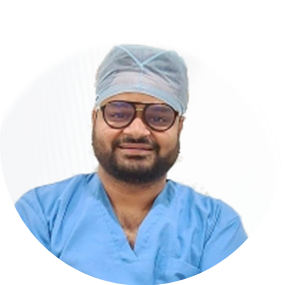Department of General Surgery
Welcome to the Department of General Surgery at Relieef Hospitals. We are committed to delivering comprehensive surgical care with a focus on precision, safety, and patient comfort. Our skilled team of surgeons performs a wide range of procedures, including appendectomies, hernia repairs, gallbladder surgeries, and more, using the latest minimally invasive and advanced surgical techniques.
With state-of-the-art infrastructure and a patient-centric approach, we ensure effective outcomes and faster recovery. From preoperative consultations to postoperative care, every step is carefully managed. We also collaborate closely with other specialties to provide integrated healthcare solutions that reflect our commitment to excellence in surgical care and overall well-being.
Frequently Asked Question
What is the Department of General Surgery?
Surgery involving the organs and structures of the body is the area of medicine known as the Department of General Surgery. This department’s surgeons are skilled in a variety of operations, including those on the breast, abdomen, digestive system, skin, and more.
Which surgical procedures are carried out in the general surgery department?
The General Surgery Department performs a wide range of operations, including as appendectomies, hernia repairs, gallbladder removal, colon surgeries, thyroid surgeries, breast surgeries, as well as operations on the gastrointestinal tract, liver, pancreas, and other organs.
How can I tell whether I require surgery?
Based on your medical condition, symptoms, and results of any diagnostic tests, your primary care physician or a specialist will decide whether surgery is required. If necessary, they will consult with you about your alternatives and refer you to the general surgery department.
How should I get ready for surgery?
You’ll receive detailed pre-surgery preparation instructions from your surgeon and medical staff. This may entail refraining from taking specific medications, fasting, and adhering to any necessary cleansing procedures. You must pay great attention to these instructions.
How long does post-operative recuperation typically last?
The length of recovery varies based on the type of operation and personal characteristics. Your surgeon will provide you detailed post-operative care instructions, including advice on how to care for your wounds, control your pain, limit your activities, and schedule follow-up appointments.
Meet Our Expert Team
Technology & Equipments
Laparoscopic Instruments
-
Laparoscope: A thin tube with a camera for minimally invasive surgeries.
-
Trocars, graspers, dissectors, and scissors: Used to manipulate tissues through small incisions.
Electrosurgical Devices
-
Cautery machines (monopolar/bipolar): For cutting tissue and controlling bleeding with electric current.
-
Harmonic Scalpel: Uses ultrasonic energy for precise dissection with minimal thermal damage.
Anesthesia Workstations
Integrate ventilators, monitors, and drug delivery systems for safe patient management during surgery.
Insurance & Financial Information
Is Relieef Hospital empanelled with my health insurance provider?
Cashless Care Made Simple at Relieef Hospital Relieef Hospital is empanelled with a wide network of insurance providers and TPAs to offer seamless cashless treatment options. To check if your insurer is on our panel, simply refer to the Relieef Hospital Insurance List or connect with our Insurance Helpdesk for quick assistance and confirmation.
What is the pre-authorisation process for cashless treatment at Relieef Hospital?
Pre-authorisation is the approval required from your insurer before you can avail of cashless treatment. At Relieef Hospital, the process is as follows:
- Inform the Hospital:
Please share your insurance details with the Insurance Desk—before admission for planned procedures, or within 24 hours in case of emergencies. This helps us ensure faster processing and a hassle-free experience. - Submit Documents:
Please provide a valid ID proof, your insurance policy details, and a duly filled pre-authorisation request form signed by your treating doctor. - Insurer Coordination:
The hospital submits your documents to the insurer or Third-Party Administrator (TPA), who reviews your coverage and may seek additional information if required. - Approval or Rejection:
Based on your policy terms, the insurer or TPA will either approve or decline the request. If approved, your treatment proceeds on a cashless basis. In case of denial, you may continue treatment and apply for reimbursement later.
What queries can my insurance provider or TPA raise during pre-authorisation?
Your insurer may ask for additional medical reports for verification, any clarifications on pre-existing conditions, detailed treatment plans for cost assessment and the policy validity confirmation.
What happens if my insurance claim is denied?
If your insurance claim is rejected, you will need to pay the bill out of pocket and later file for reimbursement. Relieef Hospital is not liable for any claim rejection by the insurance company or TPA.
Are there exclusions related to pre-authorisation?
Yes, your pre-authorisation may be denied if:
- The treatment is not medically necessary.
- The requested procedure is not covered under your policy.
- Incorrect or incomplete documentation is submitted.
 Emergency: +91 88283
53969
Emergency: +91 88283
53969













 +91 88283 53969
+91 88283 53969

